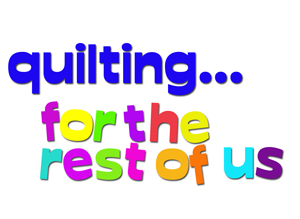I also bought the ruler just because it does make things go so much more quickly. The Strip Tube Ruler, also Cozy Quilt Designs, can be used not only for the projects in the book but just about any other time you want to quickly cut strip sets into half square triangles. The book gives you suggestions for variations, so really, the number of different projects you can do is multiplied well beyond the five in the book.
I do recommend the book, and/or the technique, and the ruler. I could have very easily gotten two baby quilts out of the blocks I got from the process. I chose to make one larger throw (64"x80"). They do also have directions for using 1 1/2" strips rather than 2 1/2" strips, if that's what you've got in your stash. I probably could have gotten the entire project done in a weekend if I'd not had anything else going on, so it's pretty fast. It's also fairly forgiving since you square up your blocks after you've done the cutting--but it still helps to have a consistent 1/4" seam!
1. The strips I was using were scrap strips that I'd accumulated from a variety of places, cut by a variety of people, and some handled more than others. That means there was a fair amount of variation in the actual width of the strip. 2 1/2" was a loose definition.
That meant that...
2. When I got my sets of three strip sets sewn together, I measured all of them before I cut the white background strips (which were supposed to be the width of the strip set). My strip sets came out a hair narrower, so I cut my background strips a hair narrower. Taking the time to do that measuring and shifting my cutting accordingly helped tremendously when it came to sewing them into the tube.
However, you can see once in awhile it wasn't quite there. Some strips were really wide. So I used the accurately cut white strips as my seam guide. My 1/4" seam was from the edge of the white, knowing that hangover on the other side ultimately wouldn't matter.
3. It helps to mark the line on the ruler you need to use with tape or something. This is a good idea anytime you're cutting a lot at the same measurement. But for some reason I had particular difficulty making sure I was always on the right line with the triangle. Even with this tape on there, I almost messed up a couple of times. (Can you see it? That pink line is semi-transparent tape.)
4. And, oops, watch the ends.
Like with the width, not all of your strips are the same length, either, so the end of the strip set won't necessarily be neat. I thought I had the whole thing in when I cut the triangle, but didn't.
5. It took me awhile to get the hang of the angle that you're cutting. You have to cut up one side of the triangle and down the other without moving the ruler, which means you're cutting at an awkward angle at least 50% of the time. And you flip the ruler over--so one block is cut with the ruler point-up, the next one is cut point-down, which also shifts your cutting angle. I finally figured out that if I made the one cut to separate the triangle from the rest of the strip, I could then move the triangle onto my rotating cutting mat to trim up the other side. Made everything much more comfortable.
6. The book tells you, and it's true, that you may need to clip some threads at the point, depending on how your ruler falls compared to the seam. Not a big deal. I did have to be careful not to shred the tip of the triangle but it went quickly.
7. But it all works out in the end, because you square up each block to end up being the same size, no matter what shenanigans may have come before!
Because I was working with such a mishmash of strip sizes to start with, not all of my points exactly match on the finished product, but I decided not to sweat that. There weren't that many points to match anyway in my setting. And, as Frances says, the muggles never notice.
So, if you're looking for (1) a great way to use all those 2 1/2" strips you've got laying around or, (2) a fast project for a gift or donation quilt, this is a great way to go for either one. I'll definitely be doing more of these in the future.
